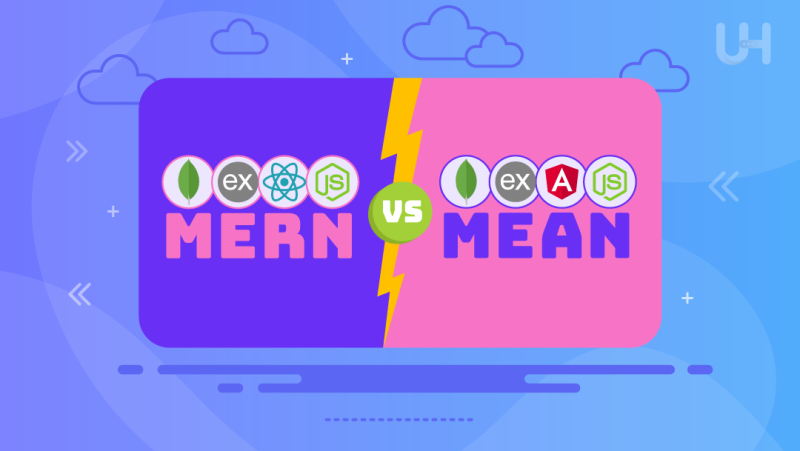Today, web development is changing continuously, and the selection of technology stack has become necessary for developing highly efficient and scalable applications, moving even faster to 2024. The debate of the MERN stack vs MEAN stack remains a hot topic among developers. These two stacks are frequently used, and both can create a dynamic website or application. However, they cater to optimized projects according to developer preferences.
MEAN and MERN are famous since JavaScript is the central theme carried out through all of their components, which helps ease development, making it easier for coders to work with only one language throughout their stack. The front-end framework debate usually boils down to either Angular or React. The article goes deep into the mern vs mean comparison, outlining the differences between the mern and mean stack, and helps you decide which fits your project requirement best.
Understanding MEAN Stack
MEAN is a complete JavaScript stack for developing cloud-ready web applications. Its robust stack allows developers to have one language, JavaScript, for both the client and server. Being a bundled front-end framework, Angular provides the functionality of the MVC (Model View Controller) architecture. Building large software applications is relatively easy due to its stronghold functionalities. Angular’s two-way data binding and solid structure make it a perfect tool to build enterprise-level applications in cases where we need complicated, feature-rich solutions. Below is a brief overview of each component within the MEAN stack:
- MongoDB: A flexible document-oriented NoSQL database model for handling large volumes of structured and unstructured data.
- Express.js: A web application framework for Node.js used to build up web applications and Application Programming Interface (APIs). It is used to reduce the server-side logic using middleware and routing techniques.
- AngularJS: AngularJS is a robust and feature-rich front-end JavaScript framework that allows developers to create dynamic, one-page applications with powerful functionalities bound to HTML data.
- Node.js: a runtime for server-side development to write network applications in JavaScript, using an asynchronous, event-driven approach that is fast and scalable.
Exploring MERN Stack

On the other hand, the MERN stack replaces Angular with React and offers the ability to develop an application with a flexible and dynamic user interface. Component-based architecture in React can take care of reusable UI components, which makes it more efficient for projects with frequent update requirements and a highly interactive user interface. React’s virtual DOM ensures that the server doesn’t take care of client changes; this makes the MERN stack even more efficient, and better performance means a good user experience. Here’s a brief overview of each component within the MERN stack:
- MongoDB: To be more specific, MongoDB is dynamic and flexible when dealing with data models. This kind of database works best as a NoSQL database with schema-less data, immense quantities of data, and dynamic schemas.
- Express.js: A minimal and flexible Node.js web application framework that provides robust features for web and mobile applications.
- React: React is a great UI library for building user interfaces. It creates interactive, stateful UI components efficiently, mainly by rendering changes through the Virtual DOM.
- Node.js: Node.js is the server-side runtime for JavaScript that acts on the V8 virtual engine. Node.js is fast and scalable for developing web applications based on MERN.
Boost Your Stack with Ideal Hosting!
Looking for quality Node.js hosting for your MEAN or MERN stack? Ultahost offers optimized plans that guarantee better productivity and performance optimization. Empower your web applications with our custom hosting today!
Key Differences: MEAN vs MERN
Here is a small comparison between the MEAN and MERN stacks, showing how the difference mainly lies in the frontend frameworks used:
| Feature | MEAN Stack | MERN Stack |
| Frontend Framework | Angular – Offers a complete framework with built-in functionalities. | React – Provides a library approach for building user interfaces, promoting flexibility. |
| Architecture | MVC (Model View Controller) – Angular provides a well-structured approach. | Component-based – React allows for reusable UI components, enhancing UI consistency and maintenance. |
| Data Binding | Two-way data binding – Angular updates the real-time data model automatically. | One-way data binding – React ensures a unidirectional data flow, which is easier to debug. |
| DOM Manipulation | Real DOM – Can slow down applications due to actual DOM tree manipulation | Virtual DOM – Allows faster updates and better performance, especially in dynamic applications. |
| Learning Curve | Steeper – Due to its comprehensive nature. | Moderate – React’s library size and flexibility make starting more accessible, but it can require additional state management tools like Redux. |
| Best Use Case | Best for enterprise-grade applications requiring a full-feature set out-of-the-box. | Best for dynamic projects with highly interactive UIs requiring scalable updates. |
The choice of a stack between MEAN and MERN depends, in general, on the needs of your project and the proficiency of your team in either Angular or React. MEAN is an all-in-one comprehensive package best suited for enterprise applications, while MERN is highly flexible and efficient for developing responsive single-page applications.
Choosing the Right Stack: MERN Stack vs MEAN Stack
Whether using MEAN or MERN stack depends on your project’s scope and your development team’s preference. MEAN stack, part of whose front end is constituted by Angular, can be used for projects that require a very organized and robust framework. The big feature pack in Angular is poised for complex development cases; therefore, it is best suited for big enterprise projects where scalability and consistency are at the forefront.
The MERN stack works best on a highly adaptable project that requires a dynamic user experience. This is possible because React is based on a component architecture that enables developers to build responsive, interactive UIs effectively. For this reason, the MERN stack is specifically valuable when the projects involve a lot of change or fine-tuning in the UI and substantive speed requirements in development and maintenance tasks.
VPS Hosting Options for Both MEAN and MERN Stacks
Performance and scalability are essential when choosing the suitable VPS hosting for deploying a developed application using MEAN or MERN stacks. Here are three kinds of VPS hosting services that fit well with these technology stacks:
NVMe VPS Hosting
NVMe VPS hosting solutions are characterized by high-speed storage, which will be implemented using SSDs on the NVMe interface instead of SSDs on SATA connections. The I/O performance would seamlessly increase, lowering the expected latencies, which perfectly suits MEAN and MERN stack applications that, most often, manage large volumes of data, requiring high-speed retrieval and storage of data. The hosting that offers NVMe can highly boost performance in database management operations, which is critical to MongoDB in both stacks.
Storage VPS Hosting
Storage VPS hosting offers enormous disk space, usually with HDDs or SSDs, to manage large datasets and extensive file storage while maintaining good performance. This can be a good deal for developing applications using the MEAN or MERN stack, which holds substantial data storage due to media, user, and log files. This ensures that enough resources for managing storage are provided and applications can handle elastic scaling efficiently.
Managed VPS Hosting
Managed VPS hosting proves to be handy for developers who love working on the code of their applications and features rather than server management. It comes with updates, security patches, and technical support, but it shouldered the server maintenance and administration right up to your door. SiteGround offers managed VPS hosting for MEAN and MERN stacks in an ideally optimized, secure, and updated infrastructure, giving a chance to deploy products or services with the complete independence to feature the code base that an application developer should have without bothering about the server environment.
The best hosting will also depend on your application’s requirements, performance needs, storage needs, and, most importantly, your team’s technical capacity to manage the server environments. While each hosting type has some advantages, they make applications built with MEAN or MERN stacks more efficient and scalable.
Conclusion
In conclusion, the choice between MEAN and MERN stacks for full-stack developers in 2024 largely depends on specific project requirements and the preferred frontend framework. MEAN, with Angular, is ideal for structured, enterprise-level applications requiring a robust framework. Conversely, MERN, leveraging React’s component-based architecture, excels in projects needing quick iterations and dynamic UIs. Both stacks are highly capable, and the decision should align with the developer’s familiarity with Angular or React and the project’s demands for flexibility and scalability.
Discover the ultimate web hosting experience with Ultlahost, where MEAN and MERN stack applications thrive on performance and reliability. Choose Ultahost for your hosting needs and elevate your web projects.
FAQ
How does Angular differ from React in these stacks?
Angular in MEAN is a full-blown framework that already encases features for use, whereas React in MERN requires the user to use separate packages. It is a building interface development model with flexible components based on one library.
Which stack is better for enterprise-level applications?
The MEAN stack is generally more geared toward enterprise applications due to Angular’s strong architecture and comprehensive features.
Which stack offers more flexibility?
The MERN stack offers more flexibility due to React’s component-based approach, which allows for dynamic and reusable UI components.
Can both stacks handle large-scale applications?
Yes, Both the stacks can, in fact, be applied to big applications; MEAN will be a perfect choice for projects needing a slightly more structured approach than the others.
Which stack is better for quick project iterations?
The MERN stack is often preferred for projects that need quick iterations due to React’s modular and reusable components.








